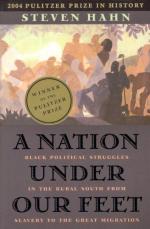
|
| Name: _________________________ | Period: ___________________ |
This test consists of 5 multiple choice questions, 5 short answer questions, and 10 short essay questions.
Multiple Choice Questions
1. Mass meetings and small gatherings proclaimed a new black __________ presence.
(a) Emotional.
(b) Political.
(c) Taxpayer.
(d) Community.
2. Slave congregations pulsed not only with ____________, but also with collective deliberation.
(a) Religion.
(b) Joy.
(c) Anger.
(d) Passion.
3. The ____________ Freedman's Convention may have been the most visible organization of this time.
(a) Texas.
(b) North Carolina.
(c) Maine.
(d) Massachusetts.
4. Hahn became interested in the history of African American struggles when he came across an account of African American __________ resistance.
(a) Labor.
(b) Voting.
(c) Political.
(d) Education.
5. What is NOT one of the types of plantations on which the slaves in the south used to work?
(a) Sugar.
(b) Rice.
(c) Cotton.
(d) Orange.
Short Answer Questions
1. Black support fed on the ideologies and customers with _______________.
2. The rural South was a luminal political world after the __________ ended.
3. The Friends of Universal ________ in Louisiana sought more radical reforms during this time.
4. Slaveholders tolerated some economic activities from slaves. Which of these is NOT one of the tolerated activities?
5. Almost 150,000 African Americans ended up fighting for the which army during the Civil War?
Short Essay Questions
1. What did Congress allow the federal government to do during the time of the reconstruction?
2. Who were typically leading the freedom movements to secure the right to vote for the African American man?
3. What was happening in society, even before the presidential election began?
4. To where did some of the free people want to immigrate in order to return to their home countries?
5. What is the African American David Medlock help to organize in Texas?
6. What is so special about the rural areas in which the African Americans lived during the time period of this book?
7. During the 1850s, what calls for political inclusion were largely ignored or rejected by society?
8. Why does Hahn focus on the rural South within the course of this book?
9. What did the Friends of Universal Suffrage want to attain with their organization?
10. What was viewed as the best way to guarantee the freedom of the slaves?
|
This section contains 556 words (approx. 2 pages at 300 words per page) |

|




